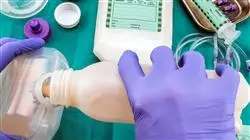University certificate
The world's largest faculty of medicine”
Introduction to the Program
Thanks to this 100% online Advanced master’s degree, you will acquire the necessary tools to adequately evaluate the nutritional status of your patients, design personalized dietary plans and monitor their progress”

Clinical Nutrition is fundamental in medical practice, recognizing its ability to positively influence the health and well-being of patients By integrating knowledge about the relationship between food and health, medical professionals can design personalized interventions that address specific medical conditions, promoting recovery, preventing disease and improving quality of life.
In this context, TECH has developed this comprehensive Advanced master’s degree, which will cover a variety of topics fundamental to understanding the interaction between food and human health Therefore, physicians will analyze in depth the principles of Nutrition, from the biochemistry of nutrients to specific dietary recommendations for various medical conditions In addition, patients' nutritional status will be assessed and personalized dietary plans will be designed In fact, graduates will use nutritional assessment tools and methods, and interpret the results to determine individual dietary needs This includes the application of specific nutritional strategies to address medical conditions such as Diabetes, Obesity, Cardiovascular Disease and many others.
Finally, professionals will be prepared to work collaboratively within multidisciplinary health care teams In this way, effective communication with other healthcare professionals will be emphasized, ensuring a comprehensive approach to patient treatment In addition, students will be equipped with the skills necessary to provide quality care and lead health promotion and disease prevention initiatives.
This Advanced master’s degree, available online, will offer students the flexibility to participate from anywhere and at their convenience It will also rely on the innovative Relearning methodology, which is pioneering in TECH and provides a unique learning experience In addition, students will have access to exclusive and complementary Masterclasses, given by experts in Clinical Nutrition, Genomic Nutrition and Intestinal Microbiota.
You will enjoy an exclusive set of additional Masterclasses, led by internationally renowned experts Access this specialized content to enrich your professional practice now!”
This Advanced master’s degree in Clinical Nutrition for Medicine contains the most complete and up-to-date scientific program on the market The most important features include:
- The development of case studies presented by experts in Clinical Nutrition in Medicine
- The graphic, schematic, and practical contents with which they are created, provide scientific and practical information on the disciplines that are essential for professional practice
- Practical exercises where the self-assessment process can be carried out to improve learning
- Special emphasis on innovative methodologies in Clinical Nutrition in Medicine
- Theoretical lessons, questions to the expert, debate forums on controversial topics, and individual reflection assignments
- The availability of access to the contents from any fixed or portable device with an Internet connection
You will implement Clinical Nutrition as a fundamental pillar in the comprehensive care of your patients, promoting healthy eating habits and preventive medical care”
It includes in its teaching staff professionals belonging to the field of Clinical Nutrition, who pour into this program the experience of their work, as well as recognized specialists from reference societies and prestigious universities.
Its multimedia content, elaborated with the latest educational technology, will enable contextual learning, ie, a simulated environment that will provide an immersive study programmed to specialize in real-life situations.
This program is designed around Problem-Based Learning, whereby the student must try to solve the different professional practice situations that arise throughout the program For this purpose, the professional will be assisted by an innovative interactive video system created by renowned and experienced experts.
You will develop leadership and management skills, necessary to lead multidisciplinary teams and promote the integration of Nutrition in medical practice"

Bet on TECH! You will delve into how different nutrients impact physiology and organ function, as well as the scientific basis behind therapeutic diets"
Syllabus
This academic program will provide physicians with a thorough and comprehensive understanding of the relationship between Nutrition and Health In fact, this content will include fundamental aspects of physiology and nutrient metabolism, as well as the assessment of nutritional status and the identification of dietary imbalances In addition, professionals will analyze the nutritional implications in the context of various diseases, from metabolic disorders to Cardiovascular Diseases and Cancer, designing therapeutic food plans adapted to the individual needs of patients.

You will address issues related to nutrition in different stages of life, Sports Nutrition, Diet Therapy and Health promotion through food”
Module 1. New Developments in Food
1.1. Molecular Foundations of Nutrition
1.2. Update on Food Composition
1.3. Food Composition Tables and Nutritional Databases
1.4. Phytochemicals and Non-Nutritive Compounds
1.5. New Food
1.5.1. Functional Nutrients and Bioactive Compounds
1.5.2. Probiotics, Prebiotics, and Symbiotics
1.5.3. Quality and Design
1.6. Organic Food
1.7. Transgenic Foods
1.8. Water as a Nutrient
1.9. Food Safety
1.9.1. Physical, Chemical, and Microbiological Hazards
1.10. Phytotherapy Applied to Nutritional Pathologies
Module 2. Current Trends in Nutrition
2.1. Nutrigenetics
2.2. Nutrigenomics
2.2.1. Fundamentals
2.2.2. Methods
2.3. Immunonutrition
2.3.1. Nutrition-Immunity Interactions
2.3.2. Antioxidants and Immune Function
2.4. Physiological Regulation of Feeding. Appetite and Satiety
2.5. Psychology and Nutrition
2.6. Nutrition and the Circadian System. Timing is the Key
2.7. Update on Nutritional Objectives and Recommended Intakes
2.8. New Evidence on the Mediterranean Diet
Module 3. Nutrigenetics I
3.1. Nutrigenetics Authorities and Organizations
3.1.1. NUGO
3.1.2. ISNN
3.1.3. Evaluation Committees
3.2. GWAS I Studies
3.2.1. Population Genetics - Design and Use
3.2.2. Hardy-Weinberg Law
3.2.3. Linkage Imbalance
3.3. GWAS II
3.3.1. Allelic and Genotypic Frequencies
3.3.2. Gene-Disease Association Studies
3.3.3. Association Models ( Dominant, Recessive, Co-dominant)
3.3.4. Genetic Scores
3.4. The Discovery of Nutrition-Related SNPs
3.4.1. Key Studies-Design
3.4.2. Main Results
3.5. The Discovery of SNPs Associated with Nutrition-Related Diseases (Diet-Depended)
3.5.1. Cardiovascular Diseases
3.5.2. Diabetes Mellitus Type II
3.5.3. Metabolic Syndrome
3.6. Main Obesity-Related GWAS
3.6.1. Strengths and Weaknesses
3.6.2. The FTO Example
3.7. Circadian Control of Intake
3.7.1. Gut-Brain Axis
3.7.2. Molecular and Neurological Basis of the Brain-Gut Connection
3.8. Chronobiology and Nutrition
3.8.1. Central Clock
3.8.2. Peripheral Clocks
3.8.3. Circadian Rhythm Hormones
3.8.4. Intake Control (Leptin and Ghrelin)
3.9. SNPs Related to Circadian Rhythms
3.9.1. Regulatory Mechanisms of Satiety
3.9.2. Hormones and Intake Control
3.9.3. Possible Pathways Involved
Module 4. Nutrigenetics II Key Polymorphisms
4.1. Obesity-Related SNPs
4.1.1. The Tale of the Obese Monkey
4.1.2. Appetite Hormones
4.1.3. Thermogenesis
4.2. Vitamin-Related SNPs
4.2.1. Vitamin D
4.2.2. B Complex Vitamins
4.2.3. Vitamin E
4.3. Exercise-Related SNPs
4.3.1. Strength vs. Competition
4.3.2. Sports Performance
4.3.3. Injury Prevention/Recovery
4.4. Oxidative Stress/Detoxification-related SNPs
4.4.1. Genes Encoding Enzymes
4.4.2. Anti-Inflammatory Processes
4.4.3. Phase I+II of Detoxification
4.5. SNP related to Addictions
4.5.1. Caffeine
4.5.2. Alcohol
4.5.3. Salt
4.7. SNP Related to Flavor
4.7.1. Sweet Taste
4.7.2. Salty Taste
4.7.3. Bitter Taste
4.7.4. Acid Taste
4.8. SNP vs. Allergies vs. Intolerances
4.8.1. Lactose
4.8.2. Gluten
4.8.3. Fructose
4.9. PESA Study
Module 5. Nutrigenetics III
5.1. SNPs Predisposing to Complex Nutrition-Related Diseases -- Genetic Risk Scores (GRS)
5.2. Type II Diabetes
5.3. Hypertension
5.4. Arteriosclerosis
5.5. Hyperlipidemia
5.6. Cancer
5.7. The Exposome Concept
5.8. Metabolic Flexibility Concept
5.9. Current Studies-Challenges for the Future
Module 6. Nutrigenomics
6.1. Differences and Similarities with Nutrigenetics
6.2. Bioactive Components of Diet on Gene Expression
6.3. The Effect of Micro and Macronutrients on Gene Expression
6.4. The Effect of Dietary Patterns on Gene Expression
6.4.1. The Mediterranean Diet Example
6.5. Main Studies in Gene Expression
6.6. Genes Related to Inflammation
6.7. Genes Related to Insulin Sensitivity
6.8. Genes related to Lipid Metabolism and Adipose Tissue Differentiation
6.9. Genes Related to Arteriosclerosis
6.10. Genes Related to the Myosceletal System
Module 7. Metabolomics-Proteomics
7.1. Proteomics
7.1.1. Principles of Proteomics
7.1.2. The Flow of Proteomics Analysis
7.2. Metabolomics
7.2.1. Principles of Metabolomics
7.2.2. Targeted Metabolomics
7.2.3. Non-Targeted Metabolomics
7.3. The Microbiome/Microbiota
7.3.1. Microbiome Data
7.3.2. Human Microbiota Composition
7.3.3. Enterotypes and Diet
7.4. Main Metabolomic Profiles
7.4.1. Application to Disease Diagnosis
7.4.2. Microbiota and Metabolic Syndrome
7.4.3. Microbiota and Cardiovascular Diseases Effect of the Oral and Intestinal Microbiota
7.5. Microbiota and Neurodegenerative Diseases
7.5.1. Alzheimer’s Disease
7.5.2. Parkinson’s Disease
7.5.3. ALS
7.6. Microbiota and Neuropsychiatric Diseases
7.6.1. Schizophrenia
7.6.2. Anxiety, Depression, Autism
7.7. Microbiota and Obesity
7.7.1. Enterotypes
7.7.2. Current Studies and State of Knowledge
Module 8. Epigenetics
8.1. History of Epigenetics. The Way I Feed Myself, a Legacy for my Grandchildren
8.2. Epigenetics vs. Epigenomics
8.3. Methylation
8.3.1. Examples of Folate and Choline, Genistein
8.3.2. Examples of Zinc, Selenium, Vitamin A, Protein Restriction
8.4. Histone Modification
8.4.1. Examples of Butyrate, Isothiocyanates, Folate and Choline
8.4.2. Examples of Retinoic Acid, Protein Restriction
8.5. MicroRNA
8.5.1. Biogenesis of MicroRNAs in Humans
8.5.2. Mechanisms of Action-Regulating Processes
8.6. Nutrimiromics
8.6.1. Diet-Modulated MicroRNAs
8.6.2. MicroRNAs involved in Metabolism
8.7. Role of MicroRNAs in Diseases
8.7.1. MicroRNA in Tumorogenesis
8.7.2. MicroRNAs in Obesity, Diabetes and Cardiovascular Diseases
8.8. Gene Variants that Generate or Destroy Binding Sites for MicroRNAs
8.8.1. Main Studies
8.8.2. Results in Human Diseases
8.9. MicroRNA Detection and Purification Methods
8.9.1. Circulating MicroRNAs
8.9.2. Basic Methods Used
Module 9. Laboratory Techniques for Nutritional Genomics
9.1. Molecular Biology Laboratory
9.1.1. Basic Instructions
9.1.2. Basic Material
9.1.3. Accreditations Required in the U.S.
9.2. DNA Extraction
9.2.1. From Saliva
9.2.2. From Blood
9.2.3. From Other Fabrics
9.3. Real-Time PCR
9.3.1. Introduction - History of the Method
9.3.2. Basic Protocols Used
9.3.3. Most Used Equipment
9.4. Sequencing
9.4.1. Introduction - History of the Method
9.4.2. Basic Protocols Used
9.4.3. Most Used Equipment
9.5. High-Throughput
9.5.1. Introduction - History of the Method
9.5.2. Examples of Human Studies
9.6. Gene Expression - Genomics - Transcriptomics
9.6.1. Introduction - History of the Method
9.6.2. Microarrays
9.6.3. Microfluidic Cards
9.6.4. Examples of Human Studies
9.7. Omics Technologies and their Biomarkers
9.7.1. Epigenomics
9.7.2. Proteomics
9.7.3. Metabolomics
9.7.4. Metagenomics
9.8. Bioinformatics Analysis
9.8.1. Pre- and Post-Informatics Bioinformatics Programs and Tools
9.8.2. GO Terms, Clustering of DNA Microarras Data
9.8.3. Functional Enrichment, GEPAS, Babelomics
Module 10. The Relationship between Intolerances/Allergies and the Microbiota
10.1. Microbiota Changes in Patients on Food Exclusion Diets
10.1.1. Eosinophilic Esophagitis (EoE)
10.2. Changes in the Microbiota in Patients with Food Exclusion Diets: Intolerance to Dairy Products (Lactose, Milk Proteins: Caseins, Albumins, Others)
10.2.1. Lactose Intolerance
10.2.2. Intolerant to Milk Proteins: Caseins, Albumins, etc.
10.2.3. People Allergic to Milk
10.3. Alteration and Recovery of the Intestinal Microbiota in Patients with Gluten Intolerance and Celiac Disease
10.3.1. Alteration of the Intestinal Microbiota in Patients with Gluten Intolerance
10.3.2. Alteration of the Intestinal Microbiota in Celiac Patients
10.3.3. Role of Probiotics and Prebiotics in the Recovery of the Microbiota in Gluten Intolerant and Celiacs
10.4. Microbiota and Biogenic Amines
10.5. Current Lines of Research
Module 11. Nutrition in Overweight, Obesity and their Comorbidities
11.1. Pathophysiology of Obesity
11.1.1. Precision Diagnosis
11.1.2. Analysis of Underlying Causes
11.2. Phenotypic Diagnosis
11.2.1. Body Composition and Calorimetry and Impact on Personalized Treatment
11.3. Treatment Target and Hypocaloric Diet Models
11.4. Prescription of Physical Exercise in Overweight and Obesity
11.5. Psychology Associated with Weight Loss Nutrition: Psychonutrition
11.6. Comorbidities Associated with Obesity
11.6.1. Nutritional Management in Metabolic Syndrome
11.6.2. Insulin Resistance
11.6.3. Type 2 Diabetes and Diabesity
11.7. Cardiovascular Risk and Nutritional Adaptations in Hypertension, Dyslipidemias and Atherosclerosis
11.8. Digestive Pathologies Associated with Obesity and Dysbiosis
11.9. Pharmacological Treatment in Obesity and Drug-Nutrient Interactions and Adaptation of the Nutritional Plan
11.10. Bariatric and Endoscopic Surgery
11.10.1. Nutritional Adaptations
Module 12. Nutrition in Digestive Tract Pathologies
12.1. Nutrition in Oral Disorders
12.1.1. Taste
12.1.2. Salivation
12.1.3. Mucositis
12.2. Nutrition in Esophagogastric Disorders
12.2.1. Gastroesophageal Reflux
12.2.2. Gastric Ulcers
12.2.3. Dysphagia
12.3. Nutrition in Post-Surgical Syndromes
12.3.1. Gastric Surgery
12.3.2. Small Intestine
12.4. Nutrition in Bowel Function Disorders
12.4.1. Constipation
12.4.2. Diarrhea
12.5. Nutrition in Malabsorption Syndromes
12.6. Nutrition in Colonic Pathology
12.6.1. Irritable Bowel
12.6.2. Diverticulosis
12.7. Nutrition in Inflammatory Bowel Disease (IBD)
12.8. Most Frequent Food Allergies and Intolerances with Gastrointestinal Effects
12.9. Nutrition in Liver Diseases
12.9.1. Portal Hypertension
12.9.2. Hepatic Encephalopathy
12.9.3. Liver Transplant
12.10. Nutrition in Biliary Diseases. Biliary Lithiasis
12.11. Nutrition in Pancreatic Diseases
12.11.1. Acute Pancreatitis
12.11.2. Chronic Pancreatitis
Module 13. Nutrition in Endocrine-Metabolic Diseases
13.1. Dyslipidemia and Arteriosclerosis
13.2. Diabetes Mellitus
13.3. Hypertension and Cardiovascular Disease
13.4. Obesity
13.4.1. Etiology. Nutrigenetics and Nutrigenomics
13.4.2. Pathophysiology of Obesity
13.4.3. Diagnosis of the Disease and its Comorbidities
13.4.4. Multidisciplinary Team in Obesity Treatment
13.4.5. Dietary Treatment. Therapeutic Possibilities
13.4.6. Pharmacological Treatment. New Drugs
13.4.7. Psychological Treatment
13.4.7.1. Intervention Models
13.4.7.2. Treatment of Associated Eating Disorders
13.4.8. Surgical Treatments
13.4.8.1. Indications
13.4.8.2. Techniques
13.4.8.3. Complications
13.4.8.4. Dietary Management
13.4.8.5. Metabolic Surgery
13.4.9. Endoscopic Treatments
13.4.9.1. Indications
13.4.9.2. Techniques
13.4.9.3. Complications
13.4.9.4. Patient Dietary Management
13.4.10. Physical Activity in Obesity
13.4.10.1. Assessment of the Patient’s Functional Capacity and Activity
13.4.10.2. Activity-based Prevention Strategies
13.4.10.3. Intervention in the Treatment of the Disease and Associated Pathologies
13.4.11. Update on Diet and Obesity Studies
13.4.12. International Intervention Strategies for Obesity Control and Prevention
Module 14. Nutrition in Nervous System Pathologies
14.1. Nutrition in the Prevention of Cognitive Impairment, Dementia and Alzheimer’s Disease
14.2. Nutrition and Psychoaffective Pathologies
14.2.1. Depression
14.2.2. Bipolar Disorder
14.3. Pathologies with Altered Eating Behavior
14.3.1. Schizophrenia
14.3.2. Borderline Personality Disorder
14.4. Eating Disorders
14.4.1. Anorexia
14.4.2. Bulimia
14.4.3. BED
14.5. Nutrition in Degenerative Pathologies
14.5.1. Multiple Sclerosis
14.5.2. Amyotrophic Lateral Sclerosis
14.5.3. Muscular Dystrophies
14.6. Nutrition in Pathologies with Uncontrolled Movement
14.6.1. Parkinson’s Disease
14.6.2. Huntington’s Disease
14.7. Nutrition in Epilepsy
14.8. Nutrition in Neuralgias
14.8.1. Chronic Pain
14.9. Nutrition in Severe Neurological Injuries
14.10. Toxics, Bioactive Compounds, Intestinal Microbiota and their Relationship to Nervous System Diseases
Module 15. Nutrition in Kidney Diseases
15.1. Glomerular Disorders and Tubulopathies
15.2. Predialysis Chronic Renal Failure
15.3. Chronic Renal Insufficiency and Dialysis
15.4. Gout and Hyperuricemia
Module 16. Nutrition in Special Situations
16.1. Nutrition in Metabolic Stress Situations
16.1.1. Sepsis
16.1.2. Polytrauma
16.1.3. Burns.
16.1.4. Transplant Recipient
16.2. Oncology Patient Nutrition
16.2.1. Surgical Treatment
16.2.2. Chemotherapy Treatment
16.2.3. Radiotherapy Treatment
16.2.4. Bone Marrow Transplant
16.3. Immune Diseases
16.3.1. Acquired Immunodeficiency Syndrome
Module 17. Clinical Nutrition and Hospital Dietetics
17.1. Management of Hospital Nutrition Units
17.1.1. Nutrition in the Hospital Setting
17.1.2. Food Safety in Hospitals
17.1.3. Hospital Kitchen Organization
17.1.4. Planning and Managing Hospital Diets. Dietary Code
17.2. Hospital Basal Diets
17.2.1. Basal Diet in Adults
17.2.2. Pediatric Basal Diet
17.2.3. Ovo-Lacto-Vegetarian and Vegan Diet
17.2.4. Diet Adapted to Cultural
17.3. Therapeutic Hospital Diets
17.3.1. Unification of Diets and Personalized Menus
17.4. Bi-Directional Drug-Nutrient Interaction
Module 18. Artificial Nutrition in Adults
18.1. Enteral Nutrition
18.2. Parenteral Nutrition
18.3. Artificial Nutrition at Home
18.4. Adapted Oral Nutrition
Module 19. Physiology of Infant Nutrition
19.1. Influence of Nutrition on Growth and Development
19.2. Nutritional Requirements in the Different Periods of Childhood
19.3. Nutritional Assessment in Children
19.4. Physical Activity Evaluation and Recommendations
19.5. Nutrition During Pregnancy and its Impact on the New-born
19.6. Current Trends in the Premature New-Born Nutrition
19.7. Nutrition in Lactating Women and its Impact on the Infant
19.8. Nutrition of New-Borns with Intrauterine Growth Delay
19.9. Breastfeeding
19.9.1. Human Milk as a Functional Food
19.9.2. Process of Milk Synthesis and Secretion
19.9.3. Reasons for it to be Encouraged
19.10. Human Milk Banks
19.10.1. Milk Bank Operation and Indications
19.11. Concept and Characteristics of the Formulas Used in Infant Feeding
19.12. The Move to a Diversified Diet. Complementary Feeding During the First Year of Life
19.13. Feeding 1–3-Year-Old Children
19.14. Feeding During the Stable Growth Phase. Schoolchild Nutrition
19.15. Adolescent Nutrition. Nutritional Risk Factors
19.16. Child and Adolescent Athlete Nutrition
19.17. Other Dietary Patterns for Children and Adolescents. Cultural, Social, and Religious Influences on Childhood Nutrition
19.18. Prevention of Childhood Nutritional Diseases. Objectives and Guidelines
Module 20. Artificial Nutrition in Pediatrics
20.1. Concept of Nutritional Therapy in Pediatrics
20.1.1. Evaluation of Patients in Need of Nutritional Support
20.1.2. Indications
20.2. General Information about Enteral and Parenteral Nutrition
20.2.1. Enteral Pediatric Nutrition
20.2.2. Parenteral Pediatric Nutrition
20.3. Dietary Products Used for Sick Children or Children with Special Needs
20.4. Implementing and Monitoring Patients with Nutritional Support
20.4.1. Critical Patients
20.4.2. Patients with Neurological Pathologies
20.5. Artificial Nutrition at Home
20.6. Nutritional Supplements to Support the Conventional Diet
20.7. Probiotics and Prebiotics in Infant Feeding
Module 21. Infant Malnutrition
21.1. Childhood Malnutrition and Undernutrition
21.1.1. Psychosocial Aspects
21.1.2. Pediatric Assessment
21.1.3. Treatment and Monitoring
21.2. Nutritional Anemias
21.2.1. Other Nutritional Anemias in Childhood
21.3. Vitamin and Trace Element Deficiencies
21.3.1. Vitamins
21.3.2. Trace Elements
21.3.3. Detection and Treatment
21.4. Fats in Infant Diets
21.4.1. Essential Fatty Acids
21.5. Childhood Obesity
21.5.1. Prevention
21.5.2. Impact of Childhood Obesity
21.5.3. Nutritional Treatment
Module 22. Childhood Nutrition and Pathologies
22.1. Nutrition of Children with Oral Pathologies
22.1.1. Major Childhood oral pathologies
22.1.2. Repercussions of These Alterations on the Child’s Nutrition
22.1.3. Mechanisms to Avoid Related Malnutrition
22.2. Nutrition of Infants and Children with Gastroesophageal Reflux
22.2.1. Repercussions of These Alterations on the Child’s Nutrition
22.2.2. Mechanisms to Avoid Related Malnutrition
22.3. Nutrition in Acute Diarrhea Situation
22.3.1. Repercussions of These Alterations on the Child’s Nutrition
22.3.2. Mechanisms to Avoid Related Malnutrition
22.4. Nutrition in Children with Celiac Disease
22.4.1. Repercussions of These Alterations on the Child’s Nutrition
22.4.2. Mechanisms to Avoid Related Malnutrition
22.5. Nutrition of the Child with Inflammatory Bowel Disease
22.5.1. Repercussions of These Alterations on the Child’s Nutrition
22.5.2. Mechanisms to Avoid Related Malnutrition
22.6. Nutrition in the Child with Malabsorptive/Digestive Syndrome
22.6.1. Repercussions of These Alterations on the Child’s Nutrition
22.6.2. Mechanisms to Avoid Related Malnutrition
22.7. Nutrition in Children with Constipation
22.7.1. Nutritional Mechanisms to Prevent Constipation
22.7.2. Nutritional Approaches for Treating Constipation
22.8. Nutrition in Children with Liver Disease
22.8.1. Repercussions of These Alterations on the Child’s Nutrition
22.8.2. Mechanisms to Avoid Related Malnutrition
22.8.3. Special Diets
Module 23. Childhood Nutrition and Pathologies
23.1. Feeding Difficulties and Disorders in Children
23.1.1. Physiological Aspects
23.1.2. Psychological Aspects
23.2. Eating Disorders
23.2.1. Anorexia
23.2.2. Bulimia
23.2.3. Others
23.3. Inborn Errors of Metabolism
23.3.1. Principles for Dietary Treatment
23.4. Nutrition in Dyslipidemia
23.4.1. Nutritional Mechanisms to Prevent Dyslipidemias
23.4.2. Nutritional Mechanisms to Treat Dyslipidemias
23.5. Nutrition in the Diabetic Child
23.5.1. Repercussions of Diabetes in the Nutrition of the Child
23.5.2. Mechanisms to Avoid Related Malnutrition.
23.6. Nutrition in Autistic Children
23.6.1. Repercussions of These Alterations on the Child’s Nutrition
23.6.2. Mechanisms to Avoid Related Malnutrition
23.7. Nutrition in Children with Cancer
23.7.1. Repercussions of Disease and Treatments in the Child’s Nutrition
23.7.2. Mechanisms to Avoid Related Malnutrition
23.8. Nutrition in Children with Chronic Pulmonary Pathology
23.8.1. Repercussions of These Alterations on the Child’s Nutrition
23.8.2. Mechanisms to Avoid Related Malnutrition
23.9. Nutrition in Children with Nephropathy
23.9.1. Repercussions of These Alterations on the Child’s Nutrition
23.9.2. Mechanisms to Avoid Related Malnutrition
23.9.3. Special Diets
23.10. Nutrition of the Child with Food Allergy and/or Intolerance
23.10.1. Special Diets
23.11. Childhood Nutrition and Bone Pathology
23.11.1. Mechanisms for Good Bone Health in Childhood
Module 24. Sports Nutrition
24.1. Physiology of Exercise
24.2. Physiological Adaptation to Different Types of Exercise
24.3. Metabolic Adaptation to Exercise. Regulation and Control
24.4. Assessing Athletes’ Energy Needs and Nutritional Status
24.5. Assessing Athletes’ Physical Ability
24.6. Nutrition in the Different Phases of Sports Practice
24.6.1. Pre-Competition
24.6.2. During
24.6.3. Post-Competition
24.7. Hydration
24.7.1. Regulation and Needs
24.7.2. Types of Beverages
24.8. Dietary Planning Adapted to Different Sports
24.9. Ergogenic Aids
24.10. Nutrition in Sports Injury Recovery
24.11. Psychological Disorders Related to Practicing Sport
24.11.1. Eating Disorders: Vigorexia, Orthorexia, Anorexia
24.11.2. Fatigue Caused by Overtraining
24.11.3. The Female Athlete Triad
24.12. The Role of the Coach in Sports Performance
Module 25. Assessment of Nutritional Status and Calculation of Personalized Nutritional Plans, Recommendations and Monitoring
25.1. Medical History and Background
25.1.1. Individual Variables Affecting Nutritional Plan Response
25.2. Anthropometry and Body Composition
25.3. Assessment of Eating Habits
25.3.1 Nutritional Assessment of Food Consumption
25.4. Interdisciplinary Team and Therapeutic Circuits
25.5. Calculation of Energy Intake
25.6. Calculation of Recommended Macro- and Micronutrient Intakes
25.7. Quantity and Frequency of Food Consumption Recommendations
25.7.1 Feeding Models
25.7.2 Planning
25.7.3 Distribution of Daily Feedings
25.8. Diet Planning Models
25.8.1. Weekly Menus
25.8.2. Daily Intake
25.8.3. Methodology by Food Exchanges
25.9. Hospital Nutrition
25.9.1. Dietary Models
25.9.2. Decision Algorithms
25.10. Educational
25.10.1. Psychological Aspects
25.10.2. Maintenance of Feeding Habits
25.10.3. Discharge Recommendations
Module 26. Nutritional Consultation
26.1. How to Carry Out a Nutritional Consultation
26.1.1. Analysis of the Market and Competition
26.1.2. Clients
26.1.3. Marketing. Social Networks
26.2. Psychology and Nutrition
26.2.1. Psychosocial Factors Affecting Eating Behavior
26.2.2. Interview Techniques
26.2.3. Dietary Advice
26.2.4. Stress Control
26.2.5. Child and Adult Nutrition Education
Module 27. Probiotics, Prebiotics, Microbiota, and Health
27.1. Probiotics
27.2. Prebiotics
27.3. Clinical Applications of Probiotics and Prebiotics in Gastroenterology
27.4. Clinical Applications of Endocrinology and Cardiovascular Disorders
27.5. Clinical Applications of Probiotics and Prebiotics in Urology
27.6. Clinical Applications of Probiotics and Prebiotics in Gynecology
27.7. Clinical Applications of Probiotics and Prebiotics in Immunology
27.8. Clinical Applications of Probiotics and Prebiotics in Nutritional Diseases
27.9. Clinical Applications of Probiotics and Prebiotics in Neurological Diseases
27.10. Clinical Applications of Probiotics and Prebiotics in Critically Ill Patients
27.11. Dairy Products as a Natural Source of Probiotics and Prebiotics
Module 28. Nutrition for Health, Equity and Sustainability
28.1. Sustainable Nutrition, Food Variables Influencing the Ecological Footprint
28.1.1. Carbon Footprint
28.1.2. Water Footprint
28.2. Food Waste as an Individual Problem and as a Problem Associated with the Food Industry
28.3. Biodiversity Loss at Different Levels and its Impact on Human Health: Microbiota
28.4. Toxics and Xenobiotics in Food and their Effects on Health
28.5. Current Food Legislation
28.5.1. Labeling, Additives and Regulatory Proposals in Marketing and Advertising
28.6. Nutrition and Endocrine Disruptors
28.7. The Global Obesity and Malnutrition Epidemic, Associated with Inequity: “A Planet of Fat and Hungry People”
28.8. Feeding in Childhood and Youth and Habits Acquisition in Adulthood
28.8.1. Ultraprocessed Foods and Beverages other than Water: A Population Problem
28.9. Food Industry, Marketing, Advertising, Social Networks and their Influence on Food Choice
28.10. Healthy, Sustainable and Non-Toxic Food Recommendations: Policy

The contents of this Advanced master’s degree in Clinical Nutrition for Medicine will provide you with the knowledge and skills necessary to address nutritional challenges in the medical setting in a comprehensive and effective manner”
Advanced Master's Degree in Clinical Nutrition for Medicine
One of the indispensable factors in maintaining a good state of health is nutrition. In fact, nutrition has a significant influence on the adherence to treatments in patients suffering from any type of pathology, from the evolution of their condition to rehabilitation times and the probability of readmission. For this reason, nutritional management is an area that requires highly qualified professionals, especially in the latest advances it has developed. In TECH Global University we developed the Advanced Master's Degree in Clinical Nutrition for Medicine, a program with which you can develop your skills to the maximum in the field with the most complete and up-to-date content and the support of experts in the area that will guide your process.
Become a specialist in Clinical Nutrition for Medicine
Through our program, presented in a 100% online format, you will be able to access the most relevant topics and procedures in the field of clinical nutrition in order to acquire the necessary knowledge and skills to implement them in your daily practice. In this way, you will review the basics of a balanced diet in order to assess the condition of your patients, and you will calculate the nutritional requirements according to their particular situation. You will implement the trends and methods of intervention in the management of simple and complex cases, such as those requiring nutritional support. You will learn about dietary design and planning according to the different pathologies, and you will consider food safety as a principle of all professional performance. Get your qualification at the largest School of Medicine and continue advancing in your professional career.







